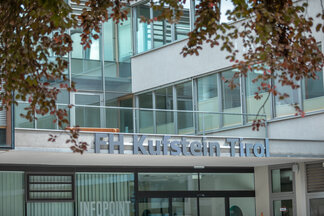Interdisciplinary and application-oriented. Our full-time master's degree program in Data Science & Intelligent Analytics equips you with the skills to leverage data streams effectively. Become an expert in making data-driven decisions!

Data Science & Intelligent Analytics
Master's degree program
Overview
-
Qualification Level:
Stufe 2, Master -
Price:
Euro 363,36* (excl. Student Union-fees) each semester -
Academic Degree:
Master of Science in Engineering (MSc) -
Academic Program:
Full-time -
Language:
100 % English -
Remote Options:
E-Learning max. 30 % online -
Exchange Semester:
Supervised study trip in the 2nd semester** -
Admission Requirements:
General admission requirements -
Study Places per Year:
25
Study program accredited by the Agency for Quality Assurance and Accreditation Austria

Program Description



Dive into the world of data science and intelligent analytics! Learn to analyze complex data sets and extract valuable insights for your organization. Be at the forefront of shaping the future of data utilization in businesses!
Our master's degree program in Data Science & Intelligent Analytics integrates computer science, statistics, mathematics, and related application disciplines. Graduates gain practical skills in data analysis, technology, business applications, and innovative solution development. We ensure exposure to complex challenges through hands-on data science labs and project-based learning. The program covers the entire value chain, from raw data to cross-functional roles to business success.
Study Focus
-
30 %
Data Analysis und Machine Learning
-
30 %
Software development with Python
-
20 %
Data storage, integration & use
-
10 %
Innovation and data management
-
10 %
Business ethics, compliance and law
What You Will Learn
-
Software development in Python
-
Machine learning in Scikit-Learn, Tensorflow, PyTorch and others.
-
Data Engineering with MySQL, MongoDB, Cassandra, Neo4J u.a.
-
Management of machine learning projects
-
Transfer of learning outcomes into practical application
Popular Occupational Fields
- Big Data Application Developer
- Data Engineer
- Big Data & BI Consultant
- Data Scientist
- Manager for Data Science Teams
- Big Data Analyst
- Specialist for Business Intelligence & Analytics
Career Opportunities
-
430+ vacancies
in IT and data analysis in Tyrol
-
EURO 50,200 average salary
for employees in the IT/data analytics sector in Austria in 2022 (according to WeAreDevelopers)
-
EUR 30.8 billion budget
for investments in IT and data processing in Austria (according to Statista) in 2021; still growing
-
+ 27.48 % increase
of revenue in the Austrian IT market by 2028 (according to Statista).
-
+3.7 % growth
in the European IT sector (according to: Gartner)
The path to the Master's degree

The degree program spans four semesters. The first two semesters establish foundational knowledge in software development, machine learning, and data engineering. In the third semester, students expand and deepen these skills through practical applications. The fourth semester is dedicated to writing the master’s thesis and completing the degree program.
Special features:
-
Practical knowledge transfer from day one
-
Study trip in the second semester
-
Practical project with an application-oriented task
Recognition of Prior Learning
Students have the option to receive credit for skills and competencies they have already acquired before the start of each semester.
To apply for credit, they must submit a request directly to the Director of Studies.
Director of Studies

Prof. (FH) Lukas Demetz, PhD
Head of IT Services & Software Development | Interim Director of Studies Bachelor Coding & Digital Design | Master Data Science & Intelligent Analytics, Web Engineering & IT Solutions
Curriculum
The following content is discussed in the course:
- Classical neural networks as a supplement to classical algorithms of data science (e.g. Random Forests, SCM, etc.)
- Fallen, artificial neural networks (CNN)
- Recursive, artificial neural networks (RNN, LSTM)
- Continuing, artificial neural networks (GAN, FARM, BERT, CGAN, etc.)
The network types discussed are subject to constant change. For this reason, only a few network types are men-tioned here as examples. Current network types are also discussed and applied in the course.
The following content is discussed in the course:
- Reasoning approaches (Roal trees, rule-based expert systems)
- Search approaches (depth-first, hill climbing, beam, optimal, branch and bound, A*, games, minimax, and alpha-beta)
- Constraint approaches (search, domain reduction, visual object recognition)
- Learning approaches (neural nets, back propagation, genetic algorithms, sparse spaces, phonology, near misses, felicity conditions, support vector machines, boosting)
- Representation approaches (classes, trajectories, transitions)
- Possible applications of artificial intelligence in different contexts
- Weak versus strong, artificial intelligence
This course is offered together with the Web Communication and Information Systems Master program as an elective course.
The following exemplary contents are discussed in the course:
- Biology (e.g. genome research, medical diagnostic procedures, etc.)
- Physics (e.g. object recognition through image data processing, etc.)
- Chemistry (e.g. processing of data-intensive experiments, etc.)
- Data-driven maintenance (e.g. predictive maintenance, Digital Twin)
- Data-optimized product design (e.g. design of product properties by KNN)
- Evaluation of sensor data (e.g. obstacle detection, obstacle avoidance, prediction, etc.)
- Cloud-based IoT systems (data storage and collection) - sensor evaluation via Raspberry Pi, Arduino, radio systems
The following content is discussed in the course:
- Evaluation tools with visual orientation, e.g. Bl tools such as MS PowerBl, Tableau, QlikView
- Display libraries, e.g. matplotlib.pyplot, gglot2
- Rules of visual communication, e.g. Hichert SUCCESSSS
Students are introduced to the basic features of Big Data. Special attention is paid to the handling of this data and the knowledge acquired is consolidated with examples. Suitable frameworks for solving Big Data problems are presented and worked on in interactive workshops with case studies. Examples of this are as follows:
- Apache Hadoop
- Apache Spark
- Apache Flink
- Apache Storm
- Apache Samza
- Apache Kafka
These frameworks will be explained and used with case studies. For this purpose, the centrally-provided Data Labs can be accessed.
The following content is discussed in the course:
- CRM on the strategic level
- CRM in process management
- CRM on the operative level (CRM software systems)
- Operative CRM
- Analytical CRM
- Communicative CRM
This course is offered as an elective course together with the Master's Course in Web Communication and Information Systems.
The following content is discussed in the course:
- Presentation of different user-oriented analysis platforms (e.g. KNIME, RapidMiner, Grafana)
- Presentation of different cloud solutions for data analysis (e.g. Google Cloud, AWS, Azure)
- Application of the platforms presented using the example of analysis data sets
- Discussion of the different approaches
The following content is discussed in the course:
- Design and implementation of problem-centred NoSQL databases (e.g. key-value stores, document stores, column-oriented data stores, etc.)
- Design and implementation of storage solutions for large quantities of data (big data)
In the lab, the contents of the ILV “Software Development 1” are advanced with the aid of practical exercises. The knowledge gained will be discussed in the group and thus allow a deep insight into the material and consolidation of the knowledge, which was theoretically dealt with in the ILV.
The following content is discussed in the course:
- Properties of high-performance data systems (scalability, maintainability, reliability)
- Established concepts of data storage (Relational Model)
- Historical concepts of data storage (Hierarchical Model, Network Model)
- Modern concepts of data storage (Wide-Column Model, Graph Model, Key-Value Model, Document Model, Column-Oriented Model)
- Database systems, matching the models discussed
- Scaling of data systems (replication and partitioning)
- Writing and reading in data systems (index structures, write strategies)
In the lab, the contents of the ILV "Statistical Learning 1" are advanced with the aid of practical exercises. The knowledge gained will be discussed in the group and thus allow a deep insight into the material and consolidation of the knowledge, which was theoretically dealt with in the ILV.
The following content is discussed in the course:
- Statistical measures (point and interval estimators)
- Statistical test procedures
- Grouping algorithms (classification trees, agglomerative hierarchical clustering, etc.)
- Regression algorithms (regression trees, random forests, etc.)
- Associative algorithms
- Procedures for preprocessing data (e.g. principal component analysis)
The following content is discussed in the course:
- The process of software engineering and project management for data-intensive applications
- Programming paradigms for use in data science
- Effective and efficient data structures for data-intensive applications
- Tools and software ecosystems for the development and testing of data-intensive software systems
In the lab, the contents of the ILV “Software Development 2” are advanced with the aid of practical exercises. The knowledge gained will be discussed in the group and thus allow a deep insight into the material and consolidation of the knowledge, which was theoretically dealt with in the ILV.
The following content is discussed in the course:
- Advanced modelling techniques
- Ensemble methods
- Optimization of models
The following content is discussed in the course:
- Architecture models for data-driven software development and systems
- Integration models and paradigms for implementing complex, process-oriented software ecosystems for analytical and data-driven systems
- Application of proven design patterns for data-driven applications
- Design and implementation of efficient and scalable software systems for data-driven applications
- Testing of software applications (e.g. unit tests, integration tests, etc.)
In the lab, the contents of the ILV "Statistical Learning 2" are advanced with the aid of practical exercises. The knowledge gained will be discussed in the group and thus allow a deep insight into the material and consolidation of the knowledge, which was theoretically dealt with in the ILV.
The contents of this course are not set, but will be adapted to the current prevailing trends. Content examples may include:
- New technologies in the field of Big Data Processing
- Trends in programming languages in data analysis
- New concepts of data processing (e.g. Data Lake)
- New questions in the field of data science research
- New questions in data science practice
The following content is discussed in the course:
- Intercultural competence
- Discussion with representatives from the field
The following content is discussed in the course:
- Developing a holistic understanding of the subject areas (systemic management)
-Methods for generating innovative ideas (e.g. Systematic Inventive Thinking, Design Thinking)
- Project structures and management methods for the practical implementation of innovations (e.g. change manage-ment, conflict management)
- IT-supported project documentation
The following content is discussed in the course:
- Project management techniques (e.g. SCRUM)
- Project management tools in the field of data science (e.g. GitLab)
- Techniques for documenting requirements (e.g. Sophist)
The following content is discussed in the course:
- Data protection (e.g. DSGVO)
- Privacy (e-Privacy Regulation)
- Handling of data from an ethical/moral point of view
- Compliance
Students are introduced to the theory of science and academic methods. The goals of academic methods are dis-cussed and applied to the students' own problems. During the course, the students will therefore develop a first draft exposé for a Master thesis.
In this course, students work on a real, data-centred project along the entire data value chain (from data collection, integration and storage to analysis and utilization of the data). This allows them to try out the skills they have built up in the first two semesters in a real setting and gain new insights.
The course accompanies the students while they draft and write their master thesis. The colloquium will therefore present and discuss the question/hypothesis and structure of the Master thesis. In addition, the scientific methodology of the Master thesis is discussed and questioned and advice is given on the formal design of the Master thesis.
Students independently draft a project idea for their own Master thesis, describe it in the form of an exposé and submit it to the program management for approval. Students then work on the topic and write a Master thesis, which is submitted for review.
The following content is discussed in the course:
- Design and implementation of problem-centred NoSQL databases (e.g. key-value stores, document stores, column-oriented data stores, etc.)
- Design and implementation of storage solutions for large quantities of data (big data)
In the lab, the contents of the ILV “Software Development 1” are advanced with the aid of practical exercises. The knowledge gained will be discussed in the group and thus allow a deep insight into the material and consolidation of the knowledge, which was theoretically dealt with in the ILV.
The following content is discussed in the course:
- Properties of high-performance data systems (scalability, maintainability, reliability)
- Established concepts of data storage (Relational Model)
- Historical concepts of data storage (Hierarchical Model, Network Model)
- Modern concepts of data storage (Wide-Column Model, Graph Model, Key-Value Model, Document Model, Column-Oriented Model)
- Database systems, matching the models discussed
- Scaling of data systems (replication and partitioning)
- Writing and reading in data systems (index structures, write strategies)
In the lab, the contents of the ILV "Statistical Learning 1" are advanced with the aid of practical exercises. The knowledge gained will be discussed in the group and thus allow a deep insight into the material and consolidation of the knowledge, which was theoretically dealt with in the ILV.
The following content is discussed in the course:
- Statistical measures (point and interval estimators)
- Statistical test procedures
- Grouping algorithms (classification trees, agglomerative hierarchical clustering, etc.)
- Regression algorithms (regression trees, random forests, etc.)
- Associative algorithms
- Procedures for preprocessing data (e.g. principal component analysis)
The following content is discussed in the course:
- The process of software engineering and project management for data-intensive applications
- Programming paradigms for use in data science
- Effective and efficient data structures for data-intensive applications
- Tools and software ecosystems for the development and testing of data-intensive software systems
The following content is discussed in the course:
- Developing a holistic understanding of the subject areas (systemic management)
-Methods for generating innovative ideas (e.g. Systematic Inventive Thinking, Design Thinking)
- Project structures and management methods for the practical implementation of innovations (e.g. change manage-ment, conflict management)
- IT-supported project documentation
The following content is discussed in the course:
- Project management techniques (e.g. SCRUM)
- Project management tools in the field of data science (e.g. GitLab)
- Techniques for documenting requirements (e.g. Sophist)
The following content is discussed in the course:
- Classical neural networks as a supplement to classical algorithms of data science (e.g. Random Forests, SCM, etc.)
- Fallen, artificial neural networks (CNN)
- Recursive, artificial neural networks (RNN, LSTM)
- Continuing, artificial neural networks (GAN, FARM, BERT, CGAN, etc.)
The network types discussed are subject to constant change. For this reason, only a few network types are men-tioned here as examples. Current network types are also discussed and applied in the course.
In the lab, the contents of the ILV “Software Development 2” are advanced with the aid of practical exercises. The knowledge gained will be discussed in the group and thus allow a deep insight into the material and consolidation of the knowledge, which was theoretically dealt with in the ILV.
The following content is discussed in the course:
- Advanced modelling techniques
- Ensemble methods
- Optimization of models
The following content is discussed in the course:
- Architecture models for data-driven software development and systems
- Integration models and paradigms for implementing complex, process-oriented software ecosystems for analytical and data-driven systems
- Application of proven design patterns for data-driven applications
- Design and implementation of efficient and scalable software systems for data-driven applications
- Testing of software applications (e.g. unit tests, integration tests, etc.)
In the lab, the contents of the ILV "Statistical Learning 2" are advanced with the aid of practical exercises. The knowledge gained will be discussed in the group and thus allow a deep insight into the material and consolidation of the knowledge, which was theoretically dealt with in the ILV.
The following content is discussed in the course:
- Intercultural competence
- Discussion with representatives from the field
The following content is discussed in the course:
- Reasoning approaches (Roal trees, rule-based expert systems)
- Search approaches (depth-first, hill climbing, beam, optimal, branch and bound, A*, games, minimax, and alpha-beta)
- Constraint approaches (search, domain reduction, visual object recognition)
- Learning approaches (neural nets, back propagation, genetic algorithms, sparse spaces, phonology, near misses, felicity conditions, support vector machines, boosting)
- Representation approaches (classes, trajectories, transitions)
- Possible applications of artificial intelligence in different contexts
- Weak versus strong, artificial intelligence
This course is offered together with the Web Communication and Information Systems Master program as an elective course.
The following exemplary contents are discussed in the course:
- Biology (e.g. genome research, medical diagnostic procedures, etc.)
- Physics (e.g. object recognition through image data processing, etc.)
- Chemistry (e.g. processing of data-intensive experiments, etc.)
- Data-driven maintenance (e.g. predictive maintenance, Digital Twin)
- Data-optimized product design (e.g. design of product properties by KNN)
- Evaluation of sensor data (e.g. obstacle detection, obstacle avoidance, prediction, etc.)
- Cloud-based IoT systems (data storage and collection) - sensor evaluation via Raspberry Pi, Arduino, radio systems
The following content is discussed in the course:
- Evaluation tools with visual orientation, e.g. Bl tools such as MS PowerBl, Tableau, QlikView
- Display libraries, e.g. matplotlib.pyplot, gglot2
- Rules of visual communication, e.g. Hichert SUCCESSSS
Students are introduced to the basic features of Big Data. Special attention is paid to the handling of this data and the knowledge acquired is consolidated with examples. Suitable frameworks for solving Big Data problems are presented and worked on in interactive workshops with case studies. Examples of this are as follows:
- Apache Hadoop
- Apache Spark
- Apache Flink
- Apache Storm
- Apache Samza
- Apache Kafka
These frameworks will be explained and used with case studies. For this purpose, the centrally-provided Data Labs can be accessed.
The following content is discussed in the course:
- CRM on the strategic level
- CRM in process management
- CRM on the operative level (CRM software systems)
- Operative CRM
- Analytical CRM
- Communicative CRM
This course is offered as an elective course together with the Master's Course in Web Communication and Information Systems.
The following content is discussed in the course:
- Presentation of different user-oriented analysis platforms (e.g. KNIME, RapidMiner, Grafana)
- Presentation of different cloud solutions for data analysis (e.g. Google Cloud, AWS, Azure)
- Application of the platforms presented using the example of analysis data sets
- Discussion of the different approaches
Students are introduced to the theory of science and academic methods. The goals of academic methods are dis-cussed and applied to the students' own problems. During the course, the students will therefore develop a first draft exposé for a Master thesis.
In this course, students work on a real, data-centred project along the entire data value chain (from data collection, integration and storage to analysis and utilization of the data). This allows them to try out the skills they have built up in the first two semesters in a real setting and gain new insights.
The contents of this course are not set, but will be adapted to the current prevailing trends. Content examples may include:
- New technologies in the field of Big Data Processing
- Trends in programming languages in data analysis
- New concepts of data processing (e.g. Data Lake)
- New questions in the field of data science research
- New questions in data science practice
The following content is discussed in the course:
- Data protection (e.g. DSGVO)
- Privacy (e-Privacy Regulation)
- Handling of data from an ethical/moral point of view
- Compliance
The course accompanies the students while they draft and write their master thesis. The colloquium will therefore present and discuss the question/hypothesis and structure of the Master thesis. In addition, the scientific methodology of the Master thesis is discussed and questioned and advice is given on the formal design of the Master thesis.
Students independently draft a project idea for their own Master thesis, describe it in the form of an exposé and submit it to the program management for approval. Students then work on the topic and write a Master thesis, which is submitted for review.
Study regulations to download
-
Data Science & Intelligent Analytics
in effect since October 21, 2024, start of study program from academic year 2025/26
- All study regulations
Frequently Asked Questions
Do I need any previous knowledge to start studying?
Yes, prior knowledge of mathematics and statistics (8 ECTS) and computer science (6 ECTS) is required for admission to the degree program. Applicants who lack this knowledge can make up for it with our free video-based preparatory course.
How high is the proportion of technology in the course?
Our aim is to provide our students with the tools to work on data analysis projects themselves. For this reason, we try to integrate a high proportion of hands-on units into our courses. The technical part is 50% and is supplemented by application-oriented complementary subjects (e.g. Systemic Innovation or Business Ethics Compliance & Law).
Which target groups does the course appeal to?
Our students come from a wide variety of professional and academic backgrounds. We bring together business economists, physicians, biologists, pharmacists, people with an industrial background and many more. We see it as our task to impart skills in the field of data analysis and technology support that are required in various areas of application.










